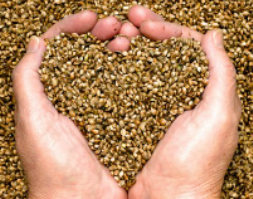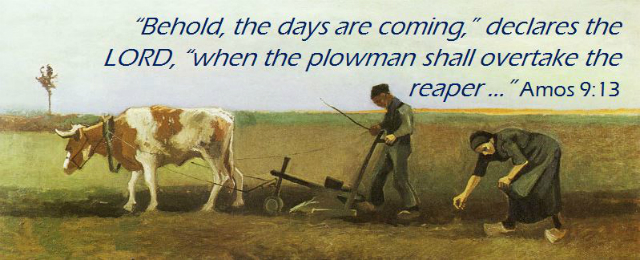For everything there is a season, and a time for every activity under heaven … a time to plant, and a time to harvest. Ecclesiastes 3:1-2 (NLT)
Recognizing that there is a right time for things is not the same as recognizing for what a time is right.
As we survey the spiritual landscape of our culture we can readily see that our nation is in great need of the Gospel. Indeed, missiologists have declared North America to be the third largest mission field in the world. This is certainly a time of need. But of what are we in need?
Is this a time for sowing or a time for reaping?
As I read, listen to, and study much of the discussion among leaders in the church today, I get the distinct impression that many of the people wanting to be faithful to Christ’s Great Commission see this time as a time for reaping. In the face of congregations declining, there are calls for church multiplication. As people slip away from the church into the raging and destructive currents of culture, reaching new people is promoted as our highest priority. As our nation grows increasingly hostile to sound doctrine and practice, seeking greater relevance to – even acceptance by – a culture that opposes the Gospel is held up as our best course of action.
In the spiritual desert of America, many well intentioned leaders plan and act as though the Word has been sown and that the fields are white with harvest.
But are the fields of America white with harvest? Or do we live and labor in a different season?
When Jesus used the word picture of fields white with harvest to instruct His disciples (see John 4:35), He was speaking to them in a context and a time very different than 21st Century America. The Samaritan hillside streaming with the citizens of Sychar was indeed white with harvest. But it was a time and place for reaping because others had been faithful in an earlier time of sowing. “I sent you to reap that for which you did not labor,” He told His disciples. “Others have labored, and you have entered into their labor” (John 4:38).
There is a time for sowing and a time for reaping. In which time are we?
Since Jesus used an image from agriculture, we can better understand what He was teaching by considering how farming works. A farmer is more likely to enjoy harvesting than sowing, but no farmer would skip sowing and rush ahead to reaping. He knows that there is no reaping without sowing. He also knows that the reaping is in the sowing because the seeds sown into the ground contain the harvest. They, like the Word of God, must be sown and nurtured before there can be reaping.
Have we let our preference for reaping blind us from seeing that we live in a time and place for sowing?
Do we keep looking for fields white with harvest even though we have, for too many decades, failed to sow the Gospel?
Are we willing to pray that the workers for whom we are to pray might be sowers instead of harvesters – even if we ourselves are the sowers that the Lord of the Harvest sends?
Or are we dissatisfied with our calling to be sowers because we’d rather that someone else would already have done the hard work of plowing, sowing, and nurturing so that we could join late in their labor for the joy of the harvest?
I suspect that if Jesus were speaking to His disciples in America today, He’d say something like “You say the harvest is ready, but I tell you that the fields are barren and dry and empty. I sent you to sow My Word so that others may reap. Be glad, for you are joining with them in their work.” And He would certainly repeat what He told His disciples outside of Sychar so long ago, “Already the one who reaps is receiving wages and gathering fruit for eternal life, so that sower and reaper may rejoice together. For the saying here holds true, ‘One sows and another reaps’” (John 4:36-37).
Jesus assures us that there will be both sowing and reaping. And He reminds us that there is a time to sow and a time to reap.
Ours is a time to sow … and a time to rejoice.
Questions to consider:
- Sowing and reaping come at different times and in different places (even within the same culture). Do I see America as being in a time of reaping or a time of sowing? In which time is my community?
- When is the planting of new churches (a.k.a., church multiplication) an act of sowing? When is it an act of reaping?
- How does neglecting the spiritual care of existing members in order to reach new people impact our ability to sow? How can we sow in ways that meets the needs of existing members while also reaching new people?
- In what ways does embracing our culture damage our ability to sow God’s Word? How can we engage our culture in order to more effectively sow the Gospel?
- How can I find joy in the call to sow rather than reap?


